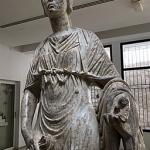At the end of his letter to the Romans,* Paul commends a woman named Phoebe. Her credentials are that she is a fellow believer in Jesus Messiah (“our sister”), a minister from Cenchreae, and the presumed carrier of the letter to the Romans. She also appears to be the letter’s reader. Paul identifies her as a benefactor of many. Phoebe thus appears to be a woman leader in the Bible, though of course, not the only one. We will explore Phoebe’s role in the early community in Christ.
(* See my previous post: “Who were the Recipients of Romans?“)
Phoebe in Romans 16:1–2
My translation of the relevant passage is as follows:
(16:1) Now I commend to you Phoebe our sister, who is a minister of the church in Cenchreae,
(16:2) so that you may receive her in the Lord in a manner worthy of the saints and assist her in whatever undertaking she might have need of you. For she has also been a benefactor of many and of myself as well.
Phoebe Recommended

At the end of his letter to the Romans, Paul commends Phoebe. The Greek verb “commend” (synistēmi/ συνίστημι) means to present, recommend, introduce, commend (see Romans 3:5; 5:8; Galatians 2:18). Here it refers to one person commending another, which was frequent done in letters (see 2 Cor 3:1–3; 4:2; 6:4; 10:12, 18).[1] It was sort of like our present-day business or interview referrals in which someone with expertise or authority vouches for someone else. Towards the close of his letters, Paul commends his fellow workers to his letter recipients, as he does here (see synistēmi in 1 Cor 16:10–12, 15–18; Col 4:7–9; cf. Eph 6:21–22).
Given that her name originates from Greek mythology as one of the Titanesses born from Ouranos and Gaea (e.g., Hesiod, Theoginis. 136, 406), she is probably a gentile (non-Jew). She apparently is single or a widow because her husband is not mentioned. And she is also wealthy if she has the ability to travel to other countries and is named a benefactor. Elsewhere in the New Testament we find women in the cities that Paul evangelized with such prominence (Acts 13:50; 17:4, 12; also possibly 16:14–15).
Phoebe as a Church Leader
As a woman of means, she very likely owns a home in Cenchreae (Kenchreia), an Eastern seaport city several miles away from Corinth. There is a good chance that a congregation of Christ’s followers meets in her house. Believers frequently met in homes for “church” in the first century.
Interestingly enough, Paul calls her a minister at the church in that town. He uses a feminist present participle form of eimi (“is” or “being”: οὖσαν). This may suggest that she has a continuing role there as a minister, not simply an appointment as minister for a special task.[2] No doubt, she is a leader of some sort, along with perhaps being the hostess of the church.
A question arises as to whether the term for “minister,” which is διάκονος (diakonos), means “deacon” here. If so, then her she holds an official church position, similar to the deacons described in Philippians 1:1 and 1 Timothy 3:8–13.
Early congregations did not seem to have a problem with women as “deaconesses,” even if slaves. Within several decades after Paul wrote this letter, Pliny the Younger, a Romans statesman on official business to spy on Christians for Emperor Trajan, interrogates by torture two Christian women slaves who are deacons (Pliny, Epistles 10.96.8). Carolyn Osiek and Kevin Madigan collected a catalog of 65 ancient inscriptions with women as deacons.[3]
Is Phoebe a Deacon or Minister?
The question is whether in 57 CE, when Paul is writing Romans, the office of “deacon” was already established. Would the Romans at this time recognize the term diakonos as an office?
Earlier in this letter, Paul used to the term to describe a non-Christian government role (Rom 13:4). He also uses diakonos in a non-official way to refer to Christ as a servant-minister (Rom 15:18). Beyond this, the related terms of “ministry” (διάκονία: 11:13; 15:31) and “to minister” (διακονέω: 12:7; 15:25) do not refer to offices.
Moreover, Paul uses diakonos when referring to himself and his colleagues generally as a servant-ministers of the gospel (1 Cor 2:5; 2 Cor 3:6; 6:4; 11:23; cf. 1 Thess 3:2; Col 1:7). This is probably how the term was used in relation to Phoebe. She is, generally speaking, a minister similar to Paul’s other colleagues.
Phoebe as the Letter’s Carrier and Reader
Independent of her ministerial role in the church of Cenchreae, Phoebe also is the one Paul seems to be designating to bring his letter to Rome. There were no UPS or Fed-Ex in those days. Letters arrived at their destinations by means of couriers. These were frequently business travelers, delegates, or a trusted servant of wealthy individuals. A believer named Tychicus functions in this role as letter courier (Col 4:7–9; Eph 6:21–22; cf. Acts 20:4; 2 Tim 4:12; Tit 3:12), and he happens to be called a diakonos.
Phoebe not only carried to Rome Paul’s most famous letter, but she also seems to be the one who first read it before the Roman congregational gatherings. Typically such letters were read aloud before the entire congregation (a number of members would likely be illiterate; they needed to hear the spoken word). Hence, it seems that a woman was the first person to have read the greatest letter of all time!
Phoebe as Benefactor
Finally, Phoebe is a benefactor. The feminine noun προστάτις (prostatis) can refer to a female benefactor. It would be similar to the masculine προστάτης (prostatēs) that can refer to a leader, guide, governor, defender, protector, and patron (see Sophocles, Oedipus Tyrannus, 411; Plutarch, Romulus 13.7).[4]
All the same, Erlend MacGillivray argues that Phoebe is a benefactor rather than someone with patron-client relationships.[5] A celebrated third-century synagogue inscription from Aphrodisias supports this sense of prostatēs as well, though there is question as to whether that particular benefactor is female or male (Ἰαηλ [Iaēl] is the name).[6]
In keeping with the form of letter recommendations, the desired action Paul wants the Romans to take regarding his commendation of Phoebe is two-fold: 1) To welcome her in the Lord in a way that befits the saints; and 2) to assist her in whatever matters she might have need. Paul expects the Romans to be hospitable to her and assist her in her undisclosed endeavors.
As a wealthy women, the Romans’ assistance could hardly be related to food, clothing, or even shelter given that Phoebe has money to take care of herself. One suspects that she may be establishing in advance a support base for Paul’s future missions, including Spain (Rom 15:24–28).[7] In the role of benefactor perhaps she supports Paul’s missionary travels financially.
More information on Phoebe will be forthcoming in my upcoming commentary on Romans.
Further Resources and Links on Phoebe
A number of resources are available for further studies on Phoebe, some of which are freely accessible on the internet. Here is a short list with links (click on the respective titles to open):
Bird, Michael. “Romans 16 and Women Leaders in the Church.” Word from the Bird.
Dixon, Rob. “Phoebe: Deacon and Benefactor.” Faithward
Gaventa, Beverly Roberts. “Listening to Phoebe Read Romans.” Film from Youtube.
Gooder, Paula. Phoebe: A Story, Downers Grove, IL: InterVarsity Press, 2018.
Leigh. “Women of the Bible: Phoebe.” lieghpowers.
Matthew, Susan, Women in the Greetings of Romans 16:1–6: A Study of Mutuality and Ministry in Paul’s Letter to the Romans. LNTS (London: T. & T. Clark, 2014).
Miller, Jeffrey D. “What Can We Say About Phoebe?” CBE International, Priscilla Papers, 2011.
Mowczko, Marg. “Wealthy Women in the First-Century Roman World and in the Church.” margmowezko.com
Peppard, Michael. “Household Names: Junia, Phoebe, & Prisca in Early Christian Rome.” Commonweal 145.10 (June1, 2018)
Notes
[1] See my commentary, Exploring Second Corinthians, RRA 3 (SBL Press, 2016), ad. loc.
[2] Frank Thielman, Romans, ZECNT (Grand Rapids: Zondervan, 2018), 710, brings up this frequently overlooked point. On the best Romans commentaries, see my Top 12 Romans Commentaries.
[3] Madigan and Osiek, Ordained Women in the Early Church: A Documentary History. (John Hopkins University Press, 2011); Information from Michael Peppard, “Household Names: Junia, Phoebe, & Prisca in Early Christian Rome.” Commonweal 145.10 (June1, 2018) https://www.commonwealmagazine.org/household-names
[4] See, for example, The Brill Dictionary of Ancient Greek, (Francisco Montanari) ad loc.
[5] Erlend D. MacGillivray, “Romans 16:2, προστάτις/προστάτης, and the Application of Reciprocal Relationships to New Testament Texts,” Novum Testamentum 53 (2011) 183–199.
[6] See, for example, James D. G. Dunn, Romans, WBC (Word, 1988), 2:888.
[7] Proposing such a scenario is Robert Jewett, Romans, Hermenia (Minneapolis: Fortress, 2007), 946–48; cf. 926, 938–40.














